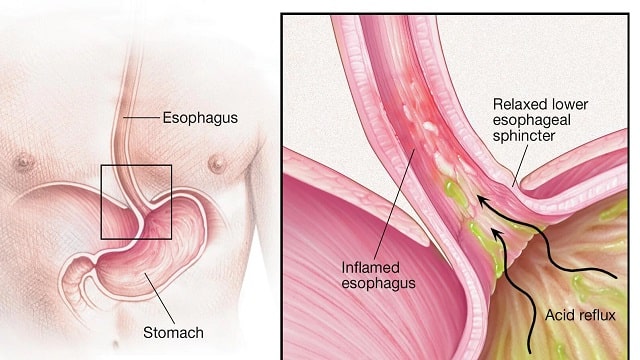Heartburn
Heartburn is a disorder experienced right behind the sternum. The pain becomes more intense after eating, at night or lying down and bending over.
Heartburn Symptoms
Symptoms of heartburn include:
- Burning chest pain that occurs after eating and at night.
- Pain that worsens when lying down or bending over.
- Bitter or sour taste in the mouth.
- Often wake up from sleep.
- Burping excessively.
- Coughing.
- A burning sensation that appears in the throat.
- It feels like there is liquid coming out of the throat.
Causes of Heartburn
Heartburn occurs when stomach acid rises back up into the esophagus. When food is swallowed, the muscle around the bottom of the esophagus (esophageal sphincter) relaxes to allow food and drink to pass into the stomach. Then, the muscle tightens again.
If the lower esophageal sphincter does not function properly, stomach acid will flow back into the esophagus (acid reflux). This condition causes heartburn.
Heartburn Trigger Factors
There are several types of food and drink that can increase the risk of heartburn, including:
- Spicy food.
- Onions.
- Citrus fruits.
- Tomato sauce
- Fatty foods.
- Fried food.
- Chocolate
- Alcohol, soda, and caffeine.
- Overweight or obesity.
- Pregnancy.
Diagnosis Heartburn
Some procedures to diagnose heartburn include:
- X-ray. The purpose is to see the shape and condition of the esophagus and stomach.
- Endoscopy. This procedure is to see the condition of internal organs using a small tube with a camera. This tool also functions to take tissue samples for analysis.
- Acid probe test. Identifying when and how long stomach acid has been rising into the esophagus. The method involves placing an acid monitor in the esophagus. The device is connected to a small computer that is worn on the waist or shoulder.
- Esophageal motility test. Its purpose is to measure the movement and pressure within the esophagus.
Heartburn Treatment
Some recommended medications include:
- Antacids. This medicine works to help neutralize stomach acid.
- H2 blockers. These drugs work to reduce stomach acid. They don’t work as quickly as antacids, but they can provide longer-lasting pain relief.
- Proton pump inhibitors. These drugs work to reduce stomach acid.
Heartburn Complications
Heartburn that is not treated immediately can trigger:
- Damage or injury to the wall of the esophagus.
- Narrowing of the esophageal wall which results in difficulty swallowing.
- Vomiting blood.
Heartburn Prevention
Healthy lifestyles to help prevent heartburn include:
- Maintain an ideal weight.
- Do not wear tight clothing. This can put pressure on the stomach and lower esophageal sphincter.
- Do not consume foods that can trigger heartburn.
- Do not lie down after eating. Wait 2 to 3 hours first.
- Do not eat before bed.
- Position your head higher when lying down.
- Avoid smoking and consuming alcohol.
- Eat small portions, but often.
- Exercise to help control weight.

